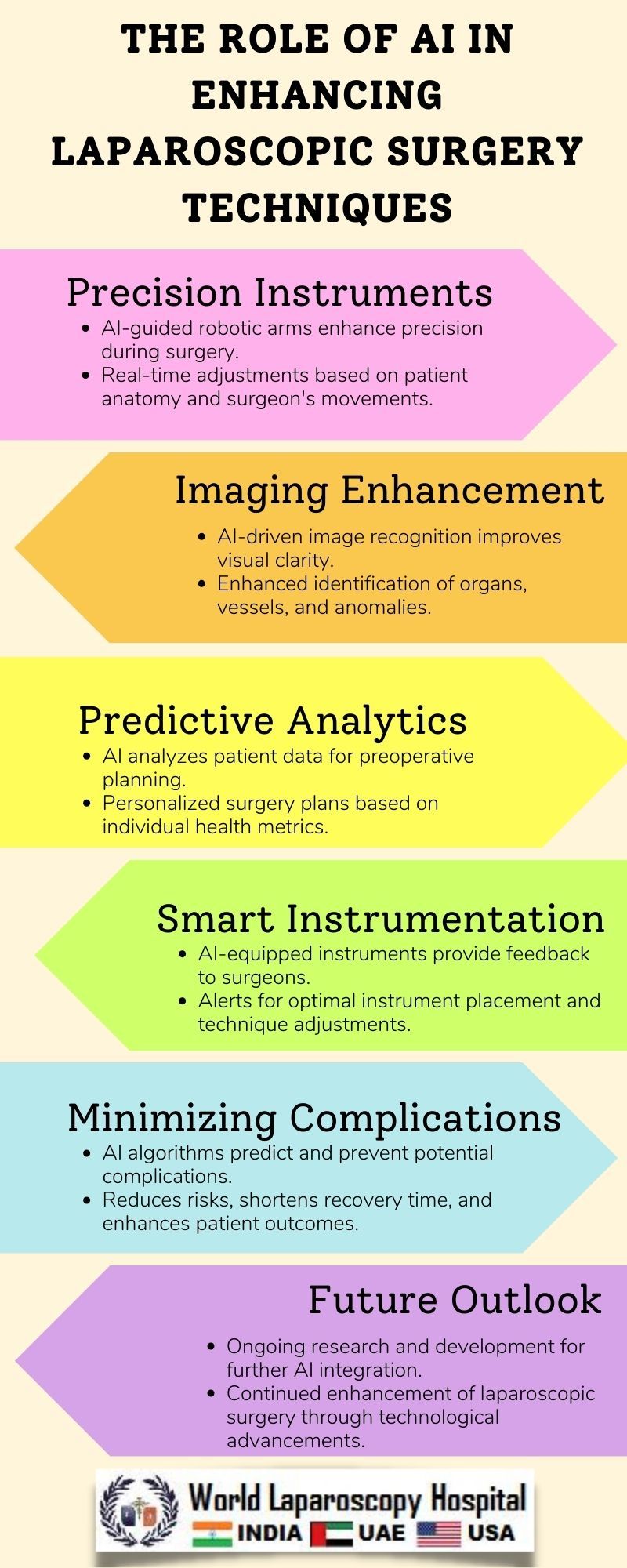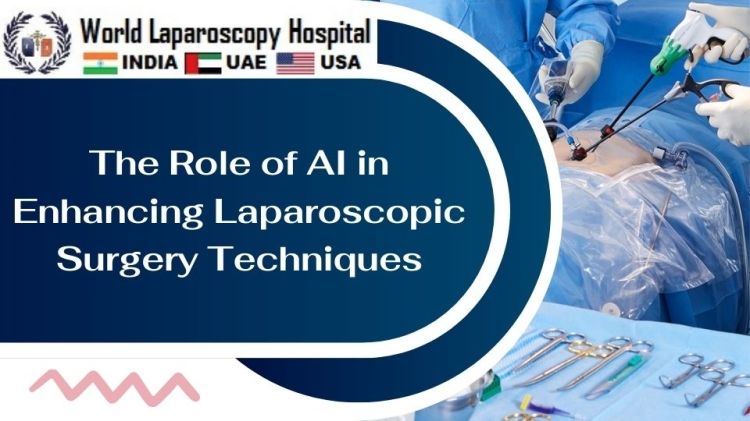The Role of AI in Enhancing Laparoscopic Surgery Techniques
Introduction:
Laparoscopic surgery, also known as minimally invasive surgery, has transformed the landscape of medical procedures by minimizing incisions and promoting quicker recovery times. Over the years, technological advancements have played a crucial role in refining and expanding the capabilities of laparoscopic surgery. Among these, Artificial Intelligence (AI) stands out as a revolutionary force, significantly enhancing the precision and effectiveness of laparoscopic techniques.

The Evolution of Laparoscopic Surgery:
Laparoscopic surgery emerged in the 20th century as a groundbreaking alternative to traditional open surgery. With smaller incisions and the use of specialized instruments and cameras, surgeons gained access to internal organs with reduced trauma to surrounding tissues. Patients experienced less pain, shorter hospital stays, and faster recoveries. However, the manual nature of laparoscopic surgery presented challenges in terms of precision and decision-making.
The Rise of Artificial Intelligence in Medicine:
As AI technologies burgeoned, the medical community recognized their potential to address challenges in various fields, including surgery. Machine learning algorithms, a subset of AI, demonstrated the ability to analyze vast datasets and extract valuable insights. This capability made AI an ideal candidate for augmenting laparoscopic surgery, where real-time analysis and decision-making are critical.
Image Recognition and Anatomical Precision:
One of the primary ways AI enhances laparoscopic surgery is through image recognition. AI algorithms can analyze high-resolution images captured by laparoscopic cameras, identifying anatomical structures with remarkable accuracy. This capability provides surgeons with real-time assistance, allowing for more precise navigation and identification of organs, vessels, and other critical structures.
Real-time Decision Support Systems:
AI-powered decision support systems have become invaluable tools in laparoscopic surgery. These systems analyze patient data, surgical images, and historical medical records to provide surgeons with real-time insights and recommendations. For instance, an AI algorithm can alert the surgeon to potential complications, suggest alternative approaches, or identify anomalies that may not be immediately apparent, enhancing the overall safety and success of the procedure.
Automation of Repetitive Tasks:
Laparoscopic surgery involves a series of intricate and repetitive tasks, such as suturing and tissue manipulation. AI-powered robotic systems have been developed to automate these tasks, reducing the burden on surgeons and enhancing the precision of movements. The integration of AI-driven robotics into laparoscopic procedures has led to improved dexterity and the ability to perform complex maneuvers with greater accuracy.
Reducing Surgical Errors and Enhancing Training:
AI has shown promise in minimizing surgical errors by providing real-time feedback to surgeons during procedures. This feedback loop can help prevent inadvertent damage to surrounding tissues and organs. Additionally, AI has been utilized in the training of aspiring surgeons through virtual simulations and augmented reality applications, allowing them to practice and refine their skills in a controlled environment.
Improved Patient Outcomes:
The incorporation of AI in laparoscopic surgery has translated into tangible benefits for patients. The precision afforded by AI technologies results in reduced complications, faster recovery times, and shorter hospital stays. Patients experience less postoperative pain and enjoy improved overall outcomes, contributing to a higher quality of care in the field of surgery.
Challenges and Ethical Considerations:
While the integration of AI in laparoscopic surgery brings about numerous advantages, it is not without challenges and ethical considerations. Issues such as data privacy, algorithm bias, and the potential for overreliance on AI systems must be carefully addressed. The ethical use of AI in surgery requires transparent guidelines, ongoing monitoring, and a commitment to prioritizing patient safety and well-being.
The Future of AI in Laparoscopic Surgery:
As technology continues to advance, the future of AI in laparoscopic surgery holds exciting possibilities. Further refinements in machine learning algorithms, the development of more sophisticated robotic systems, and the integration of AI with other cutting-edge technologies like augmented reality and 3D printing are on the horizon. These innovations promise to push the boundaries of what is currently achievable in minimally invasive surgery.
Conclusion:
The marriage of AI and laparoscopic surgery represents a transformative leap in the field of surgical medicine. The precision, efficiency, and improved patient outcomes facilitated by AI technologies underscore their indispensable role in advancing laparoscopic techniques. As ongoing research and technological developments unfold, the synergy between human expertise and artificial intelligence will continue to shape the future of surgery, opening new frontiers for innovation and patient care.


